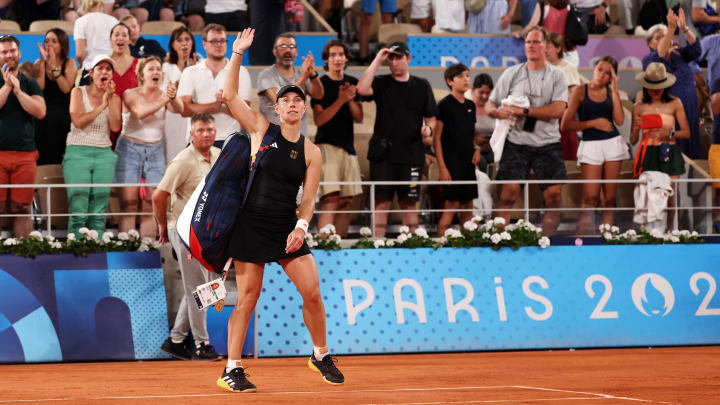German Tennis Star Angelique Kerber Bids Adieu at the Paris Olympics

A day after she was accused of being a competitor unworthy of respect, China's Qinwen Zheng advanced to the semifinals of the women’s singles Olympic tennis event with a 6–7, 6–4, 7–6 win over Germany’s Angelique Kerber. It was precisely the kind of spirited comeback win that demands respect.
But let today’s discussion be about the defeated player. For this match—that, fittingly, ended in a third-set tiebreaker—marks the end of Kerber’s career, a run as estimable as it is instructive.
It’s a swell life being a mid-tier tennis player. It’s financially lucrative and there’s lots of travel, often exotic. You work for yourself. It beats most desk jobs.
But for Kerber, it was ultimately unsatisfying. For her first five or six years on tour, she was tracking for a fine career. A converted lefty, she won her share of matches, even reaching the odd major semifinal. But when she entered her mid-20s, her ranking had barely entered its mid-20s.
Then, the deluge. Kerber changed coaches, got herself into peak shape, retooled her game to maximize her strengths (like speed) and minimize her weaknesses (like her second serve) … and the results came fast.
The same month she turned 28, she claimed her first major title, beating Serena Williams in a three-set final to win the 2016 Australian Open. At Wimbledon that year, she again reached the final, this time losing to Williams. Less than a month later, she earned silver in women’s singles at the Rio Olympics. Barely a month after that, she closed out her breakthrough year, winning the U.S. Open and becoming the oldest player in WTA history to ascend to the No.1 ranking.
Not that she was done. Winning became a habit. In 2018, the year she turned 30, she made the semifinals in Australia, the quarterfinals in Paris and then won Wimbledon, again beating Williams. Suddenly, the modest player for the first half of her career was a generational player, one French Open short of the career slam.
After a year off for maternity leave, Kerber was still bringing it this season, mixing defense with offense, power with lefty deception. But then came five straight defeats this summer and her decision to say fertig.
Kerber leaves the sport with Hall of Fame credentials. She leaves with over $30 million in prize money, one of the 10-highest totals in WTA history.
Above all, she leaves as a figurehead for the idea that your career is what you want it to be. If you’re unsatisfied working in the equivalent of middle management, it’s possible to break through a glass ceiling and become the best player in the world.
